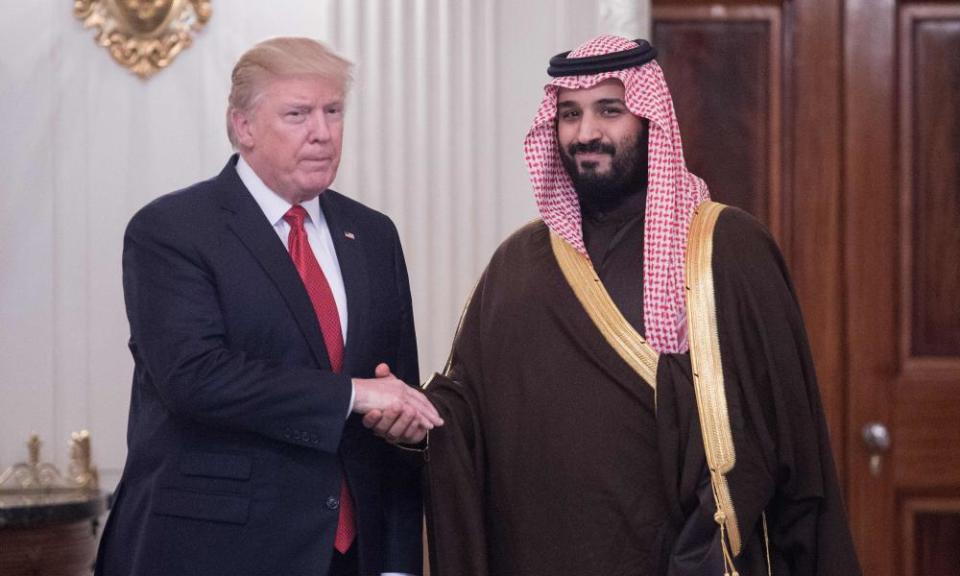Regime change in Iran is Trump’s real motive for siding with the Saudis

It would be comforting to think Donald Trump sent his secretary of state, Mike Pompeo, hotfooting it to Saudi Arabia this week to solve the mystery of what happened to the missing journalist, Jamal Khashoggi. It would be nice to believe Trump cared that much about a reporter, and a foreign reporter at that, whose sudden disappearance occurred far from America’s shores.
But this is the same Trump who recently condemned independent journalists as “enemies of the people” – a statement Dean Baquet, editor of the New York Times, warned in August had “sent a message to despots abroad that you can disrespect the press”. Did Mohammed bin Salman, the Saudi crown prince, take Trump’s words as a green light?
In any case, altruism is not really Trump’s thing. His real motives in stepping into the middle of the Khashoggi affair, and crudely attempting to shape the investigation, have become steadily clearer. His stance has gradually gravitated towards exculpation of the Saudis. He has moved from threatening to impose “severe punishment”, if it is confirmed the regime murdered Khashoggi, to speculating about “rogue killers” and insisting Saudi leaders be presumed innocent until proven guilty.
Why this body-swerve into obfuscation? Trump has courted the royals of Riyadh from the beginning of his presidency. His sycophantic son-in-law, Jared Kushner, assiduously cultivated bin Salman. Yet Trump is not known for loyalty. He ruthlessly dumps people who become a problem. Why, then, is the US president playing PR frontman and spin-doctor-in-chief to a shifty bunch of unelected chancers? Why these absurd theories about Khashoggi’s fate, reminiscent of the Kremlin after Salisbury?
It’s true the US-Saudi relationship is deemed an important one. It’s true some American jobs depend on arms sales to the kingdom. It’s possible the Saudis’ payment of $100 million to help stabilise Syria – the cash, held back since August, suddenly appeared in US government accounts on Tuesday, the day Pompeo landed in Riyadh – may have influenced Trump. But none of this fully explains why he is laying the ground to exonerate the regime in general and bin Salman in particular.
The answer can be spelled out in four letters: Iran. Trump realised, belatedly, that his long-plotted strategy for confronting Iran, which culminates on 5 November with a sweeping, potentially crippling global embargo on Iranian oil, cannot work without Saudi support.
The plan, which many analysts believe is actually an attempt to force regime change in Tehran, depends on the Saudis pumping extra oil to compensate for the anticipated shortfall. If not, the outcome could be a worldwide oil shock, with rapidly rising prices and massive, negative knock-on impacts on international markets and trade.
That’s why Trump refuses to contemplate sanctions, such as suspending arms sales, as urged in Congress. For the same reason, he has failed to check the Saudi-led carnage in Yemen. Iran is why Trump will not apply his punitive tool of choice – penalties on named individuals in foreign governments – in the Khashoggi case. Surely nobody honestly believes the high-risk Istanbul operation was undertaken without the prior knowledge of bin Salman, Saudi Arabia’s most powerful man. But sanctioning him would blow up Trump’s entire Iranian bonfire night plot.
Remember how we reached this point. As a candidate, Trump bought into the dodgy narrative, promoted principally by the Saudis and Benjamin Netanyahu, Israel’s prime minister, that Iran was the main fomenter of instability across the Middle East, that it was intent on destroying Israel, and that its quest for regional hegemony included duplicitous pursuit of nuclear weapons. In May, Trump reneged on the multilateral nuclear deal with Iran. Next month, he will penalise European allies, and anybody else, who dares do business with Iran.
Addressing the UN last month, Trump put the world on notice that “extreme” sanctions, backed by the tacit threat of military force, were intended to undermine, if not overthrow, what he called a “corrupt dictatorship” in Tehran. He spoke in apocalyptic terms: “Iran’s leaders sow chaos, death and destruction. They do not respect their neighbours, or the sovereign rights of nations.”
That’s rich, coming from this American president. With those words, Trump, like George W Bush in 2003, served up a fake casus belli. Yet in order to win this latest American war of choice, he must have the Saudis on side.
Trump needs the Saudis not only because the oil embargo could prove chaotic without them. He will also need their political and military cooperation if, as threatened, Iran’s Revolutionary Guards take reciprocal, physical action to halt Saudi and Gulf states’ oil exports via the Strait of Hormuz in the Gulf and the Bab-el-Mandeb strait, at the mouth of the Red Sea. If this crisis point is reached, escalating confrontations across the region cannot be ruled out.
Attracted by a dictatorial style of governance he evidently admires, Trump’s Middle East policy pivots on the Saudi alliance. He has swallowed Netanyahu’s false nuclear narrative and been suckered into the age-old Sunni-Shia struggle. With epic misjudgment, he bet his shirt on a known hothead, Mohammed bin Salman, who many now suspect is a cold-blooded killer. That’s why he badly needs to bury the Khashoggi affair, whatever the truth of the matter. He sent Pompeo to fix it. So far, Pompeo has failed.
For Trump, his not-so-secret desire to take down the Tehran regime is more important than one man’s grisly fate. He has demonised Iran as the arch-enemy – the latest incarnation of America’s enduring need for a bogeyman. But for a watching world, Iran is not the obvious problem. Saudi Arabia’s leadership is.
• Simon Tisdall is a foreign affairs commentator. He has been a foreign leader writer, foreign editor and US editor for the Guardian

 Yahoo News
Yahoo News 